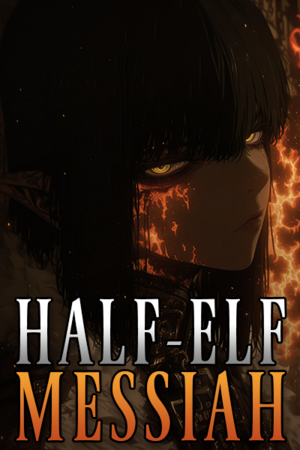Half-Elf Messiah has a simple and intuitive plot. The main character is born a slave. You can guess the rest from there; struggle, oppression, injustice, rebellion, breaking your shackles et cetera. All of these themes tied up in an intricately built setting with prose so eloquent you would think it akin to poetry. What results is a truly enjoyable read that is both short and sweet.
The author takes us on a journey knowing not to rush through it nor to bog us down in a marsh. We are taken on a journey where we can learn small hints as to how the setting's logic functions, what roles the characters play, and get a real feel for the world we find ourselves in. Exposition comes in small bits and pieces, and we are truly familiarized to the main character's new life, though we know next to nothing from his previous one. It makes me wonder why this story had to be an isekai apart from the fact that it was made as a submission to the MAL x Honeyfeed Isekai Contest.
The story is greatly nuanced, I find. When Isayah—the main character—described his mother as an elvish slave subjected to human oppressors, I feared the author would head into a simplistic direction whereby they would depict slavery as a purely racial wrong, the fact that his mother was dark-skinned only enforcing that preconception—perhaps seeking to comment on modern issues as well.
Nuance was quickly introduced as we learned that not only (dark) elves, but also humans were being enslaved. Though there exists much blatant racism in this world, both human and elves being complicit therein (another sign of nuance), the issue of slavery is not approached from a purely racial subject. That, to me, was a sigh of relief. Many believe slavery to be a one-sided wrong committed only in the name of race, while any student of history would find such a notion most unfounded and ridiculous. I thus have to commend Uriel for the nuance presented in the story, avoiding simplistic conflicts as "humanz= le racist exploitative bad guys, elves=le epic wholesome downtrodden good-doers."
As stated both previously and in the review's title, Uriel's prose is most excellent. It is an absolute joy to read, and I believe to have learned much from it as well. The words flow as I read them with ease, not racking my brain once to comprehend the sentences—everything was clear, and my brain soaked up all the information in an instant.
However, this brings with it a glaring problem too. The issue regarding the diction of the characters—why do they speak the way that they do? Why does Isayah always say "for" instead of "because" in sentences such as: "For I am used as a living shield" (Chapter 27)? Why would Isayah speak in such an dramatic way unless he used to be a highly educated, perhaps literary-loving writer in his past life? We know next to nothing about his past, so we don't know if he should be speaking like this, or if the author simply wanted to write in their own preferred style of writing. It seems most characters speak with certain eloquence, which would be appropriate if all of them were aristocrats conversing in a palace, but would not fit the tone of the average, roughed-up, illiterate slave. The only character who really should be eloquent is Jesha.
Speaking of Jesha, his character brings us to another flaw in the writing; namely, the character-writing. Jesha is introduced as an indifferent, efficiency-obsessed bureaucrat. Seemingly out of nowhere, without much build-up, he turns from this apathetic administrator—whom Isayah regards with neutrality—to a sleazy, conniving, creepy, and scheming politician who wants nothing more than to manipulate the main character to his advantage—making the victim in question despise him with utmost hate. It is jarring. How come he switches up so radically, so suddenly? Perhaps Uriel struggled in writing this character, because though I understood his motives, I could barely comprehend his execution thereof.
To summarize my thoughts, both to the reader questioning whether to give this story a chance (you should) and to the author, Uriel, themselves. Genuine feedback:
- The prose, the world-building, the drama, the nuance, and the pacing; all simply phenomenal. Keep this up! You are creative, and you manage to put that creativity into words—I am very jealous! You do not fall into generic story beats or monotony—you keep things fresh and interesting; leagues above most writers in this animanga type medium.
- The characters, their diction, and dialogue; they are lacking. I would not say they fall flat, but they leave much to be desired. I can relate to this, because I struggle with character- and dialogue-writing myself. Characters need to have backstories, especially the main character. They need to speak according to that backstory. And lastly, they need to converse with that personality and character in mind.
